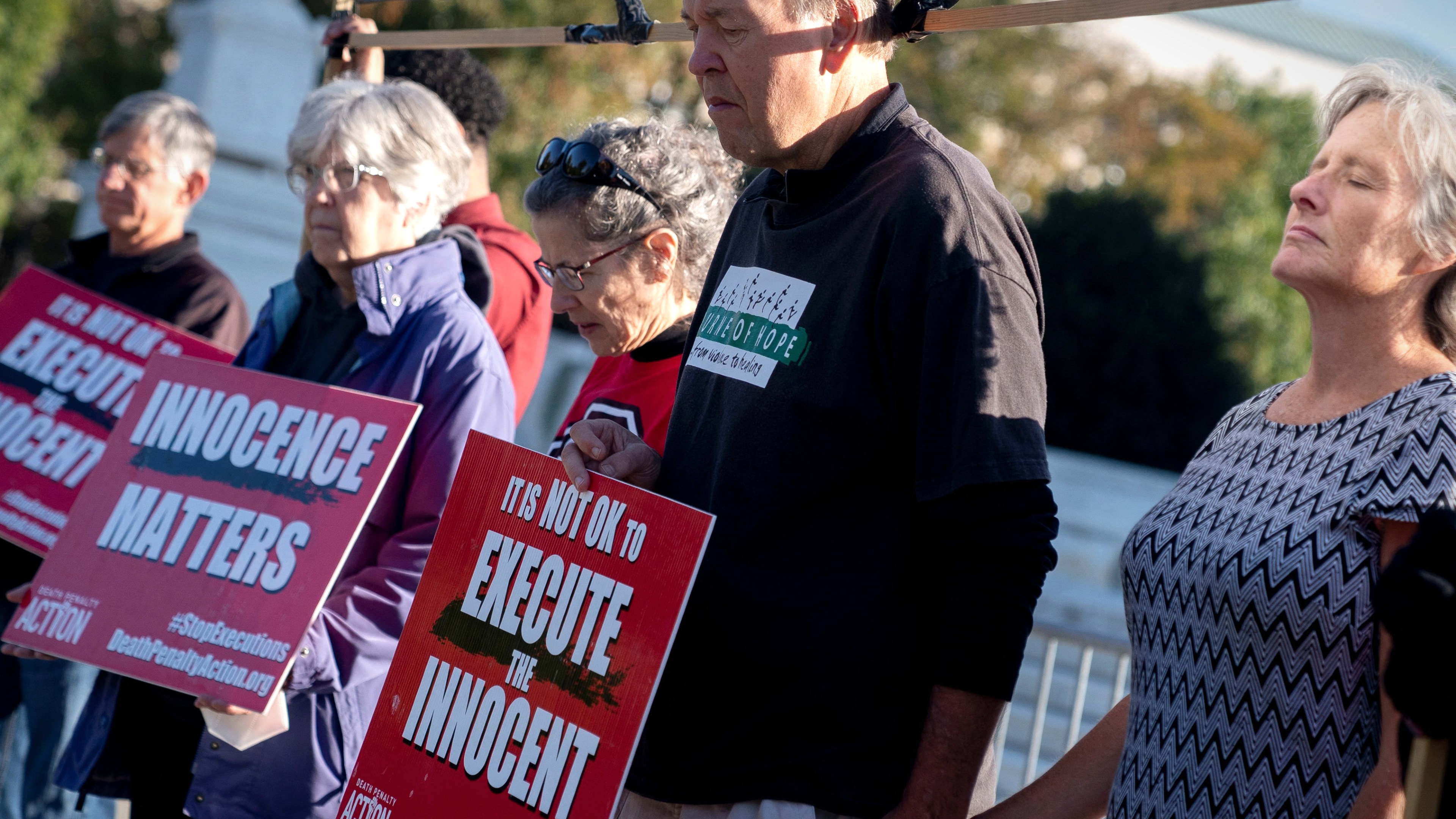Pros and cons of using the death penalty
MP calls for ‘legally binding referendum’ as new poll shows more Britons support bringing back capital punishment than oppose it

A free daily email with the biggest news stories of the day – and the best features from TheWeek.com
You are now subscribed
Your newsletter sign-up was successful
An MP has reignited the debate over the death penalty in Britain by calling for a “legally binding referendum”, as a new poll shows a majority of the public now support bringing it back.
Addressing the House of Commons last week, Rupert Lowe, the former Reform UK MP who now sits as an independent, said voters should be able to decide if there are circumstances “where the guilt is so undeniable, crime is so monstrous, the evil so irredeemable” that capital punishment should be an option.
Keir Starmer responded that while violent crimes “should be condemned” and dealt with by the police and courts, “re-introducing the death penalty is not the answer to this”.
The Week
Escape your echo chamber. Get the facts behind the news, plus analysis from multiple perspectives.

Sign up for The Week's Free Newsletters
From our morning news briefing to a weekly Good News Newsletter, get the best of The Week delivered directly to your inbox.
From our morning news briefing to a weekly Good News Newsletter, get the best of The Week delivered directly to your inbox.
Recent decades have seen a “clear trend” away from capital punishment around the world, with “more than 70%” of countries having abolished the practice, said the Death Penalty Information Center, a US-based non-profit. Most of those who still carry out state executions are authoritarian regimes such as China, Iran and Saudi Arabia, while the US “remains an outlier” among democracies for its use of the death penalty.
Here are some of the major arguments for and against capital punishment.
Pro: public support
The latest major survey in the US by Gallup found that while the death penalty enjoys less support among younger generations, a majority of Americans (53%) are still “in favour of the death penalty for a person convicted of murder”.
Support in the UK, which had been in slow decline since hangings were abolished in the 1960s, is also on the rise. A YouGov poll this month found more Britons support reintroducing capital punishment (50%) than oppose it (45%), with 42% of the public believing capital punishment should be the standard sentence when it comes to murder.
A free daily email with the biggest news stories of the day – and the best features from TheWeek.com
Support was highest among Reform voters (82%) and Conservatives (67%), with 35% of Labour voters, 30% of Lib Dems and 26% of Greens backing the return of capital punishment.
Con: wrongful execution risk
“The death penalty carries the inherent risk of executing an innocent person,” said the Death Penalty Information Center. It found that in the past 50 years, at least 200 people who were on death row in the US have been exonerated. “The remaining question is how many innocent lives are worth sacrificing to preserve this punishment.”
Statistically this means that “for every 10 people on death row who are executed, at least one person on death row is innocent”, said Dr Bharat Malkani at the University of Birmingham. It could be argued that exonerations “prove that the appeals system is working”, but in reality, it is “more than likely that innocent people have been executed in recent years”.
Often, “people from the margins of society, particularly people of colour”, are those who “disproportionately face execution” due to “racial bias, inadequate legal defence, incentivised informants and unreliable evidence”, said The Innocence Project, regarding cases in the US. These factors “consistently pervert justice at the expense of innocent lives”.
Pro: could reduce crime
“Nobody has ever committed a crime after being executed,” Reform UK MP Lee Anderson said in 2023, as he called for the return of the death penalty in Britain.
There is little evidence to support the idea that the death penalty reduces crime, but “fearmongering” remains a “potent political weapon”, particularly for Republican politicians in the US, said Duncan Hosie in The Washington Post. “Over-the-top fealty to the death penalty still resonates with some voters. And as long as it does, opportunistic politicians will exploit these impulses to gain power.”
In September, Donald Trump signed a presidential memorandum directing the full enforcement of capital punishment laws in Washington to “deter and punish the most heinous crimes in our nation’s capital”. He previously said the death penalty for murder would act as a “very strong preventative”.
Con: not a deterrent
“Study after study shows that the death penalty does not deter crime,” said Scientific American. Instead, it is “cruel and inhumane” without showing significant benefits.
Zimbabwe, whose president once faced the death penalty himself, abolished capital punishment after its senate approved a bill in December last year. Before the bill was approved, said Amnesty International, there was a group pushing for it to remain “in the erroneous belief that it acts as a deterrent to crime”. But “no empirical evidence” exists to prove that it “results in the reduction of crimes worldwide”.
Pro: sense of retribution
Of the “four major justifications for punishment” – deterrence, rehabilitation, incapacitation and retribution – it is the last of these that has “often been scorned by academics and judges”, said Robert Blecker, a professor emeritus at New York Law School, in The New York Times. But “ultimately, it provides capital punishment with its only truly moral foundation”.
The argument that the death penalty delivers closure for victims' families is highly contested but often invoked by advocacy groups and those directly impacted. For the family of Jamie Rose Bolin, who was brutally murdered by neighbour Kevin Ray Underwood in 2006, the death penalty, carried out in December 2024, was “the only just punishment”, said USA Today.
Con: expensive and easily botched
The Trump administration’s recent push for states to escalate executions has led them to return to “unreliable” methods of killing prisoners – including lethal injection, which has the “worst track record of any method of execution” and can lead to long and torturous deaths, said Austin Sarat in The Guardian.
These concerns around lethal injection have led to the use of “alternative execution methods, like nitrogen gas”, which have led to failed or painful executions, said CNN.
The death penalty can also be a more expensive procedure for the state. In countries with arduous appeals processes and strong human-rights organisations, the death penalty is, counterintuitively, far more expensive than imprisonment for life.
Richard Windsor is a freelance writer for The Week Digital. He began his journalism career writing about politics and sport while studying at the University of Southampton. He then worked across various football publications before specialising in cycling for almost nine years, covering major races including the Tour de France and interviewing some of the sport’s top riders. He led Cycling Weekly’s digital platforms as editor for seven of those years, helping to transform the publication into the UK’s largest cycling website. He now works as a freelance writer, editor and consultant.
-
 Local elections 2026: where are they and who is expected to win?
Local elections 2026: where are they and who is expected to win?The Explainer Labour is braced for heavy losses and U-turn on postponing some council elections hasn’t helped the party’s prospects
-
 6 of the world’s most accessible destinations
6 of the world’s most accessible destinationsThe Week Recommends Experience all of Berlin, Singapore and Sydney
-
 How the FCC’s ‘equal time’ rule works
How the FCC’s ‘equal time’ rule worksIn the Spotlight The law is at the heart of the Colbert-CBS conflict
-
 Executions are on the rise in the US after years of decline
Executions are on the rise in the US after years of declineThe Explainer This year has brought the highest number of executions in a decade
-
 Judge rejects top state charges in Mangione case
Judge rejects top state charges in Mangione caseSpeed Read If convicted, Mangione faces up to life in state prison
-
 South Carolina to execute prisoner by firing squad
South Carolina to execute prisoner by firing squadspeed read Death row inmate Brad Sigmon prefers the squad over the electric chair or lethal injection, his lawyer said
-
 China tries to bury deadly car attack
China tries to bury deadly car attackSpeed Read An SUV drove into a crowd of people in Zhuhai, killing and injuring dozens — but news of the attack has been censored
-
 Texas set to execute dad in disputed 'shaken baby' case
Texas set to execute dad in disputed 'shaken baby' caseSpeed Read Robert Roberson's hotly contested execution would be the first ever tied to shaken baby syndrome
-
 Missouri executes man despite DA's objection
Missouri executes man despite DA's objectionSpeed Read Marcellus Williams maintained his innocence and the killing was opposed by the victim's family
-
 A bus stop tragedy and China's anti-Japanese rhetoric
A bus stop tragedy and China's anti-Japanese rhetoricTalking Point Suzhou attack described as the product of 'decades of hate education'
-
 The secret hospitals offering criminals new faces in the Philippines
The secret hospitals offering criminals new faces in the PhilippinesUnder The Radar Two clinics suspected of giving plastic surgery to fugitives and scam centre workers expected to be shut down soon